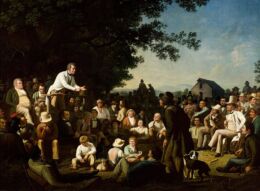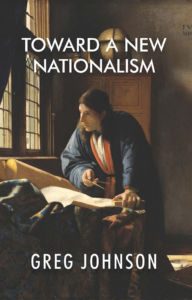White Nationalism 101

George Caleb Bingham, Stump Speaking (1853) Courtesy of Wikipedia Commons
1,484 words
The poll of white registered voters on race relations that I conducted for The Homeland Institute revealed that despite many gains in recent years, our people are still woefully uneducated about the truth regarding Martin Luther King, Jr., and by extension the broader Civil Rights paradigm.
We are well acquainted with conservative influencers singing odes to MLK despite the fact that he was a degenerate and a Communist agitator, but I was blindsided when it turned out that an overwhelming majority of respondents, even among Republicans and Republican youth, have a positive view of MLK. Admittedly, cultural change takes time, and the poll was conducted only a few weeks after Charlie Kirk had dismantled the MLK narrative. But I had assumed that the numbers would be higher regardless of Charlie Kirk’s expose, especially since today’s youth are frequently touted as being “based and red-pilled.”
This naturally highlights the need for further education. Our people might be “based,” which I would characterize as possessing good instincts, but they are nowhere as “red-pilled” as we would like them to be, which I would characterize as being well-informed on specific facts and doctrines.
Thus, Charlie Kirk’s dismantling of MLK was a major development in the culture war. Surprisingly, though, certain dissident pundits dismissed it out of hand as passé, simply because for them it was old news.
If we are going to win, we must educate our people. In fact, there are numerous parallels between our movement and a university. This can be for good or ill depending on our choices.
Modern academia is a joke and should not be emulated. There are many reasons for this, but one of the most prominent ones is that instead of focusing on teaching students, the emphasis is on “publish or perish.” This naturally leads to an emphasis on the quantity of one’s “content,” which is the natural antithesis of quality. For all their arrogant snobbery, universities produce very little of real value, especially in the social sciences. Keeping one’s ideas locked within obscure journals on JSOTR doesn’t improve their underlying quality, it only serves to diminish their impact.
The problem here, especially in the humanities, is that sometimes there isn’t anything new to say. There’s nothing wrong with this. Metaphysically, it’s not so much a matter of people thinking, but of “thoughts peopleing.” Sometimes I have a deluge of ideas and sometimes a drought. There are certainly ways to encourage one’s creativity, but ultimately it is akin to a natural force, such as the weather, which just happens when it happens. I would not write a ludicrous word salad about the Evolian metaphysics of pit bulls and then inflict it upon readers simply to produce content during a drought.
In modern academia, however, the typical solution to this problem is to search for even more convoluted theories. This would be a disaster even without the anti-white woke agenda, but in today’s context academia has devolved into absolute absurdity. Professors are always looking to find a new intersectional “hot take” on race, gender, or sexuality.
There is hardly any difference between a tenured humanities professor and a dissident shock jock. One might be establishment and the other anti-establishment, and one might write papers while the other broadcasts livestreams, but beyond that, they are extremely similar. Both are focused on producing a quantity of content instead of quality content, and both are forever proposing novel ideas not because they have value or are true, but only for the sake of novelty.
Modern academia is not something we want to model our movement upon because it’s not sustainable. It has only survived because the legacy media reinforces their deranged ideas, they have a monopoly on conferring college degrees, and because they receive lavish funding from the government and philanthropists. Without these factors, today’s woke academia would have zero influence on society, culture, or politics.

You can buy Greg Johnson’s Toward a New Nationalism here.
We want to influence the wider world as academia does, but we want to do it for the better, and with fewer resources. When we publish, it’s so that our people won’t perish.
Imagine if universities were more focused on educating instead of publishing for the sake of churning out content. I was lucky to have professors who genuinely cared about their students and who had boundless energy, but imagine how much more they could do if their primary mission was to educate students instead of publish. Society would be better off, and it would be easier and cheaper for all parties involved.
If we imagine the movement as a university, the general public are the freshmen in need of White Nationalism 101. It needs to be kept simple and defensible, and presented in relation to current events whenever possible. Just like a university, we have to constantly reteach the previous lessons whenever new students come in. For us some ideas are old, or perhaps even stale — but for newcomers, it is an exciting new adventure.
As people attain greater exposure to our ideas, they gradually morph into the equivalent of college graduates. They can be trusted to be good followers and leaders. We no longer have to worry about them falling into rookie intellectual pitfalls such as civic nationalism or mistaking Jews as white. Some — in fact many — go on to pursue the equivalent of graduate studies because of how relevant and interesting our ideas are. This advanced stage of White Nationalism is the realm of Evolian metaphysics and the like. It is at this point that one begins to not only learn, but to help to teach others.
I was in a class once where a graduate student was assigned to grade the midterm papers. He threw Cs, Ds, and even Fs around because he was grading us at the graduate instead of the undergraduate level. When some of us went to confront him during his office hours, he declared in his fruity voice that we needed more analysis. While he would have been entirely correct if we were fellow graduate students, he came across as infuriatingly condescending because we were not. Thankfully, our kindly professor intervened and saved our grades and bruised egos.
What’s ironic is that this grad student, while pompous and lacking judgment, was probably trying to help us. We could have become even better students if he had productively shown how we could do more and deeper analysis in a way that did not potentially involve making our grades suffer. But once our grades and pride became involved, we became deaf to any lessons we might have learned.
Don’t be that grad student. Being condescending to the people we are trying to teach will turn them off more than any ad hominem slur cast by the Left. The general public should be encouraged to learn about MLK. We should praise them when they apply the concept of per capita to particular crimes. We should firmly, but respectfully, correct them when they go astray regarding one of the many false paths laid down for them by the enemy. Disparaging them for learning about MLK in 2024 instead of in 2016 because we have long since moved on to Oswald Spengler is not a winning strategy.
There is still ample room for vanguardism and novelty. It provides us with prestige while also keeping us sane. But it should not detract from our primary mission: public education.
If educating the “undergraduate” general public were not a threat to the regime, they would not be conducting an extensive campaign of censorship, deplatforming, and lawfare against us. For example, the diversity-hire judge Letitia James who is targeting Donald Trump is also waging a personal lawfare campaign against VDARE. This is clearly because VDARE consistently tackles immigration in a way that is simple, direct, incisive, and defensible.
The upside to the general public’s lack of education regarding our ideas is that there is a lot of room for improvement. Once I stepped back from the initial poll results, I realized that it would almost be more discouraging if the general public were highly informed about MLK, because that would mean that this knowledge was having almost no effect on politics.
Imagine living in a country where the majority of white conservatives are well-informed about immigration, white identity, and MLK. That would be a game-changer. We are happy to educate our people, but just like a university, we need money to do it. We may not be paying diverse plagiarists a $900,000 salary per year, as Harvard pays to Claudine Gay, but we do have an operating budget. In fact, Counter-Currents’ entire operating budget is one-third of Gay’s salary.
If you’re excited by the prospect of the white electorate becoming as radicalized on Right-wing ideas as the typical college graduate is radicalized on Left-wing ideas, then I would kindly ask that you consider a donation to either Counter-Currents or The Homeland Institute — or both.



